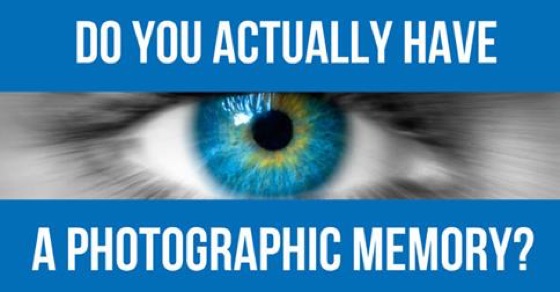

More research is necessary into both eidetic memory and hyperthymesia to understand their similarities and differences. However, it is likely that people with hyperthymesia do not have a superior eidetic memory. The reason for this may be that they are hard phenomena to test. There is little research exploring hyperthymesia and eidetic memory. Similarly to people with hyperthymesia, people with a good eidetic memory do not rely on memory devices, such as mnemonics.

However, scientific research debates the existence of photographic memory. People who claim to have a photographic memory state that they can remember a visualization for a long time in the same detail as when they first saw it. People often confuse eidetic memory with photographic memory. In some cases, the visualizations may change or become stored as a long-term memory. They may be able to hold the intact visualization in their mind for up to several minutes.įor most people, eidetic memories tend to fade after a few seconds. Those who have a superior eidetic memory can continue to visualize something they have recently seen with great precision. On the other hand, eidetic memory is the ability to accurately recall an image after only seeing it once for a short period. As such, this may enable people with hyperthymesia to preserve their memories.Ī person with hyperthymesia can remember nearly every event of their life in a lot of detail. Regularly thinking about these events helps strengthen the ability to recall them. This theory implies that people with HSAM obsessively think about their previous experiences. Some researchers believe that hyperthymesia may have psychological causes. However, current research is ongoing as to whether the ability has a genetic basis. GeneticĪnother theory is that hyperthymesia may be genetic.

One study suggests that people with HSAM may have hyperactivity in certain parts of the brain, such as the amygdala.Īnother study suggests that people with HSAM have increased activity within different regions of the brain, such as the superior and inferior parietal lobe. There is some evidence that hyperthymesia may have a biological cause. However, more studies are necessary to gain a better understanding of what causes hyperthymesia.

Some research suggests that the cause of hyperthymesia may be biological, genetic, or psychological. There are some theories as to what contributes to hyperthymesia, but the exact cause remains unknown. For example, people with HSAM do not use mnemonic devices to remember long strings of information.Īs there are relatively few people with hyperthymesia, there is a lack of research examining the causes. HSAM is different than having a good memory. However, a 2016 study suggests that these individuals have better long-term memory. People with HSAM likely process short-term memories in a similar way to most other people. People can retain information as either short-term or long-term memories. This limitation means that people can only recall information about themselves and their past personal experiences. Current research suggests that the ability is limited to autobiographical memory. These details can include exact dates and intricate information about previous experiences. According to a 2017 study, people with hyperthymesia can accurately and readily recall numerous details about events that have occurred in their life. Hyperthymesia is also known as highly superior autobiographical memory (HSAM). Share on Pinterest People with hyperthymesia often remember exact dates relating to past personal experiences.


 0 kommentar(er)
0 kommentar(er)
